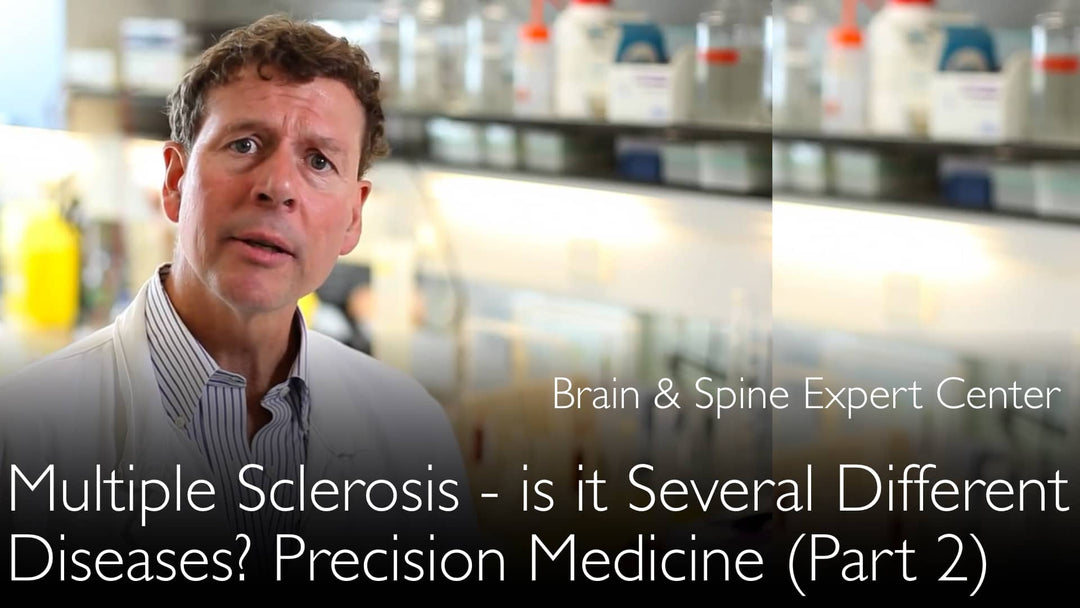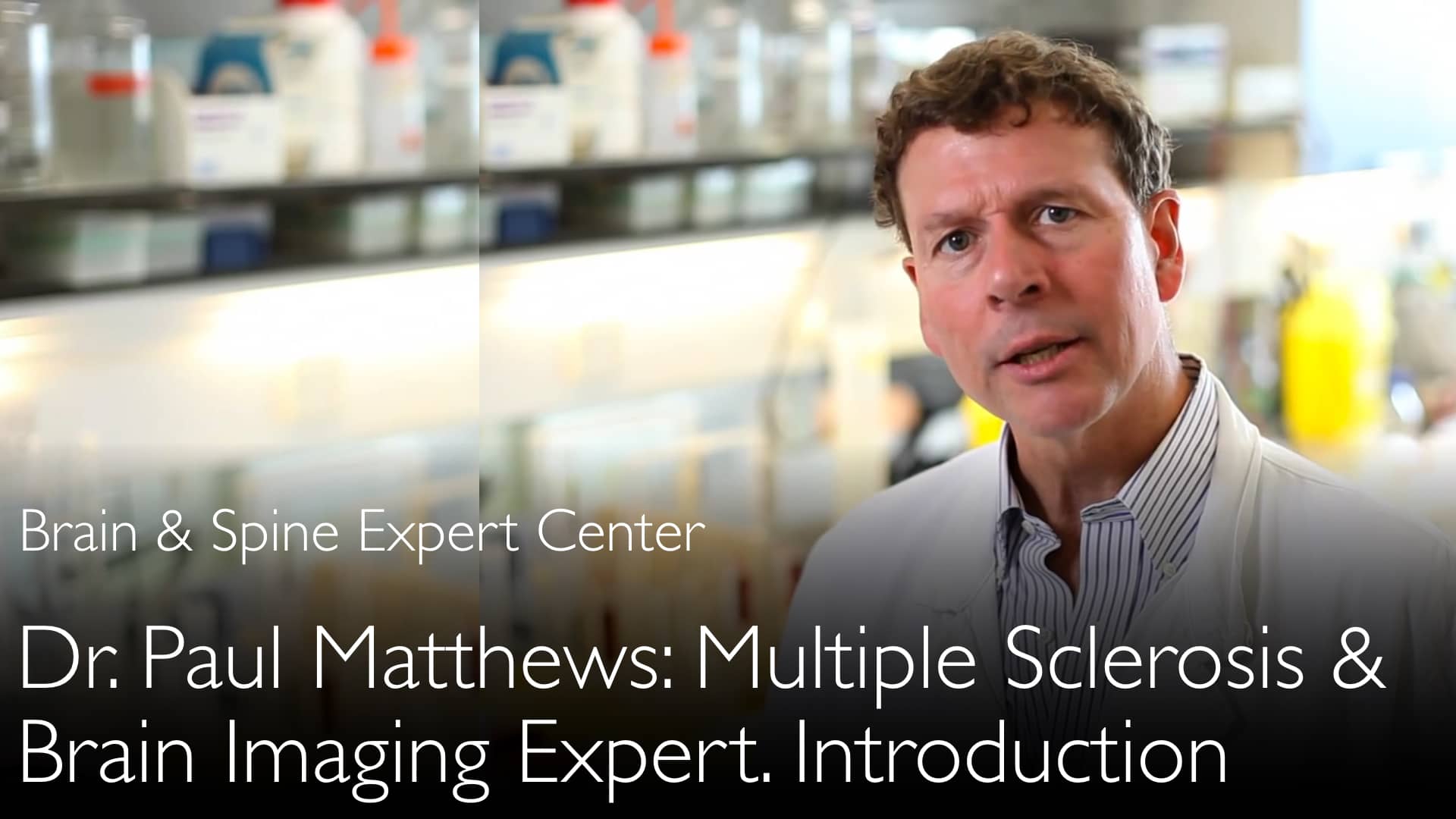מומחה מוביל בטרשת נפוצה ובהדמיית מערכת העצבים, ד"ר פול מתיוס, MD, מסביר כיצד נוירומיאליטיס אופטיקה (NMO) הוגדרה מחדש כמחלה נפרדת מטרשת נפוצה. הוא מפרט את תפקיד הנוגדן לאקוופורין-4 כסמן ביולוגי מאחד. ד"ר פול מתיוס, MD, דן בדרך המורכבת לטיפול מותאם אישית בטרשת נפוצה. זה כרוך בגורמים גנטיים, סביבתיים ובדימות תהודה מגנטית (MRI) לשם ריבוד חולים ובחירת טיפול.
הבנת נוירומייליטיס אופטיקה ועתיד הרפואה המותאמת אישית בטרשת נפוצה
קפיצה לפרק
- NMO: מחלה נפרדת
- תפקיד הנוגדן לאקוופורין-4
- גורמים גנטיים בפרוגנוזה של טרשת נפוצה
- MRI ברפואה מותאמת אישית
- התאמה אישית של הטיפול בטרשת נפוצה
- תמליל מלא
NMO: מחלה נפרדת
ד"ר פול מתיוז, MD, מבהיר כי נוירומייליטיס אופטיקה (NMO) נחשבת כיום לישות מחלה ספציפית ונפרדת מטרשת נפוצה. סיווג מחדש זה מהווה הצלחה משמעותית עבור הרפואה המותאמת אישית בנוירולוגיה. עבודה ממרפאת מאיו ואוניברסיטת אוקספורד הדגימה שתסמונת דמוית טרשת נפוצה ספציפית הייתה קשורה באופן ייחודי לנוגדן, מה שהוביל להפרדתה.
ל-NMO יש פרוגנוזה שונה, היא מגיבה באופן שונה לתרופות לטרשת נפוצה, והיא מופיעה באוכלוסיות חולים שונות בהשוואה לטרשת נפוצה קלאסית. ד"ר פול מתיוז, MD, מציין שיש צורות ספציפיות אסייתיות וקווקזיות של המחלה, שאוחדו כעת תחת הבנה חדשה זו.
תפקיד הנוגדן לאקוופורין-4
גילוי הנוגדן לאקוופורין-4 היה רגע מכונן. ד"ר פול מתיוז, MD, מסביר שנוגדן זה, שנמצא בסרום הדם, משמש כסמן ביולוגי מאחד עבור NMO. סמן ביולוגי זה סיפק מטרה ביולוגית ברורה למחקר ואבחון.
זיהוי נוגדן זה איפשר למדענים ליצור מודלים חייתיים של NMO. זה הוביל להבנה יחסית מדויקת של הפתופיזיולוגיה של המחלה, תוך מעבר מסיווג מבוסס תסמינים להגדרה מבוססת מנגנון.
גורמים גנטיים בפרוגנוזה של טרשת נפוצה
בתסמונת הטרשת הנפוצה הרחבה יותר שנותרה, גורמים גנטיים ממלאים תפקיד crucial בקביעת חומרת המחלה. ד"ר פול מתיוז, MD, מדגיש את הגנוטיפ HLA, specifically האפלטיפ HLA 1501, המקושר להתקדמות ממאירה יותר של טרשת נפוצה.
מציאת סמנים גנטיים חזקים נוספים היא תקווה מרכזית לעתיד. סמנים אלה יסייעו בשכבות חולי טרשת נפוצה ויתחילו את הדרך toward טיפול truly מותאם אישית, beyond גישה one-size-fits-all.
MRI ברפואה מותאמת אישית
ד"ר פול מתיוז, MD, מדגיש ש-MRI מתקדם הוא כלי עוצמתי להתאמה אישית של הטיפול בטרשת נפוצה. דימות MRI סדרתי בניסויים קליניים מתעד את קצב השינוי בעומס הנגעים T2, דה-מיאלינציה, אובדן אקסונים ואטרופיה מוחית.
זה מספק מבט ישיר על הפתולוגיה המתפתחת וחומרתה. ד"ר מתיוז מקווה שנתוני MRI יובילו לאלגוריתמים לשכבות חולים בצורה מדויקת much more within השנה הראשונה להופעת טרשת נפוצה, allowing להחלטות טיפול מוקדמות more and מושכלות more.
התאמה אישית של הטיפול בטרשת נפוצה
המטרה הסופית היא להתאים אישית את הטיפול בטרשת נפוצה based on פרופילים individual של חולים. ד"ר פול מתיוז, MD, states שדרך זו complex is and not תתבסס על סמן ביולוגי single. היא requires שילוב של susceptibility גנטית, גורמים סביבתיים כמו latitude ו-vitamin D, וגורמי lifestyle כמו smoking.
הערכה personalized זו helps לספק לחולים prognosis likely. With טווח broad של תרופות לטרשת נפוצה available, each with פרופילים different של efficacy ו-safety, patients and רופאים can then להחליט collaboratively על פרופיל benefit-risk הטוב ביותר עבור treatment. Some patients will need therapies highly effective, while others may benefit from options safer, less aggressive.
תמליל מלא
ד"ר אנטון טיטוב, MD: האם טרשת נפוצה מורכבת ממספר מחלות שונות? מה מראים ניסויים קליניים ב-MRI מתקדם? אתה מבצע ניסויים קליניים ב-MRI במחקרי הטרשת הנפוצה שלך.
ד"ר פול מתיוז, MD: אני חושב שכל המאזינים הנוירולוגיים מודעים well לעובדה זו. מספר תגליות התרחשו within העשור last. עבודה בטרשת נפוצה במרפאת מאיו נתמכה על ידי עבודה נוספת באוקספורד ובמוסדות others. היא הדגימה שתסמונת טרשת נפוצה specific הייתה קשורה specifically לנוכחות נוגדן.
היבט זה של תסמונת הטרשת הנפוצה היה distinct very. הנוגדן היה directed against Aquaporin 4. זהו חלבון that נמצא בסרום. Moreover, נמצא that נוגדן Aquaporin 4 זה היה responsible לצורה Oriental של Neuromyelitis optica.
יש צורה Oriental specific של Neuromyelitis optica. There is also הצורה Caucasian של Neuromyelitis optica. נוגדן זה provides סמן ביולוגי unifying עבור תסמונת זו. Much has been learned since then, because it also has been possible to make animal models of Neuromyelitis optica.
We really started to understand the pathophysiology of NMO relatively precisely. I think this is the most prominent success for a precision medicine-based approach. Neuromyelitis optica is a subgroup of syndromes that all had previously been considered to be multiple sclerosis.
Now Neuromyelitis optica has been defined as a specific disease entity. It is now considered to be quite distinct. Neuromyelitis optica responds to multiple sclerosis medications differently. NMO has different prognosis.
ד"ר אנטון טיטוב, MD: It occurs in different patient populations. Let’s look at what is left of the broader multiple sclerosis syndrome.
ד"ר פול מתיוז, MD: This is also clear. The patients with different HLA genotypes are susceptible to multiple sclerosis severity at different levels. For example, the HLA 1501 haplotype is associated with a more malignant progression of the multiple sclerosis.
Increasingly, we hope to find other strong genetic markers of multiple sclerosis. This may help us to stratify patients with multiple sclerosis. Then we can begin the path towards personalization of treatment.
Finally, I would note that the path to personalization of multiple sclerosis treatment is likely not simple. Precision medicine treatment of multiple sclerosis is not going to depend on a single biomarker. I believe that the NMO case was very fortunate, but it probably is going to be less usual.
Multiple risk factors will likely need to be taken into account for personalization of MS therapy. There are genetic, environmental, and lifestyle factors that affect multiple sclerosis. We have to recognize the influence of latitude, vitamin D levels, smoking, and other high-risk behaviors.
Genetic susceptibility factors for multiple sclerosis are also important. All of this will help us better assess multiple sclerosis patients on first visit to doctor. Then we can begin to provide patients with information about prognosis.
Finally, I think that this personalization can be enhanced substantially by the use of special MRI. MRI imaging provides us a direct view of the pathology as it evolves. Serial imaging clinical trials are able to document the rate of change of T2 lesion load in the brain.
MRI allows us to observe the accompanying damage. Damage occurs with T2 lesions expressed in terms of measures of demyelination and axon loss. MRI also measures brain atrophy.
ד"ר אנטון טיטוב, MD: Altogether serial MRIs give us a sense for the severity of the pathology in multiple sclerosis. I hope we will use it for precision medicine treatment.
ד"ר פול מתיוז, MD: MRI will lead us to algorithms to allow to stratify patients much more precisely within the first year of multiple sclerosis appearance. We can separate patients into those who really need very highly effective therapies.
We can also identify patients with multiple sclerosis who may benefit equally well from therapies with the lower anti-inflammatory efficacy in the group overall. But potentially such medications can have better safety profiles.
Clearly this is one part of the precision medicine. It is the predictive abilities at the early stages of multiple sclerosis to stratify patients. Some patients would need more aggressive multiple sclerosis therapy.
Other patients will require less aggressive therapy. Yes, I think that's true. In precision medicine we want to have a better explanation to an individual patient what is a likely prognosis.
Then the patient has to decide what is the best benefit-risk profile of multiple sclerosis treatment.
ד"ר אנטון טיטוב, MD: Patient with multiple sclerosis can choose from the broad range of medicines that we now have. Because we are in the fortunate position now. We have many medications against multiple sclerosis. They really do have such a broad range of efficacy and safety characteristics.





